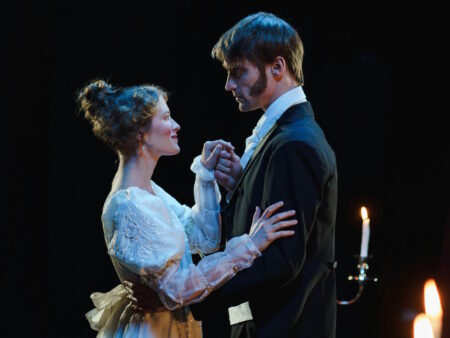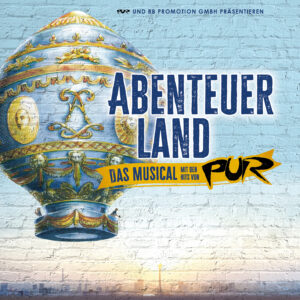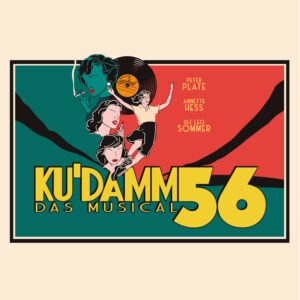Henry Purcell
The Fairy Queen
Libretto von Thomas Betterton und Elkanah Settle
Uraufführung: 02.05.1692, Dorset Garden Theatre, London
Act I
Scene: A Palace.
Enter Titania, leading the Indian Boy, Fairies attending.
TITANIA.
Now the Glow-worm shews her Light,
And twinkling Stars adorn the Night.
The Night, whose Shades are round us hurl'd,
While Phoebus lights the under World.
Now we glide from our abodes,
To Sing, and Revel in these Woods.
Are the Centries set?
1ST FAIRY.
They are.
TITANIA.
‚Tis well, if any Mortal dare
Approach this spot of Fairy-Ground,
Blind the Wretch, then turn him round.
Three times turn, and bring him in;
About him Gambol, Dance and Sing.
Pinch his Arms, his Thighs, and Shins;
Pinch, till he confess his Sins.
1ST FAIRY.
Think thy Commands already done.
About this gloomy Grove we'll run,
Swift as the Wind over the standing Corn.
TITANIA.
Now my Fairy Coire, appear:
Sing, and entertain my Dear.
Describe that Happiness, that Peace of Mind,
Which Lovers only in retirement find.
Here the new Musick begins, 1st this Song in two Parts.
First Song
Come, come, come, let us leave the Town,
And in some lonely place,
Where Crouds and Noise were never known,
Resolve to spend our days.
In pleasant Shades upon the Grass
At Night our selves we'll lay;
Our Days in harmless Sport shall pass,
Thus Time shall slide away.
BLIND POET.
Fill up the Bowl, then, etc.
FAIRY.
Trip it, trip it in a Ring;
Around this Mortal Dance, and Sing.
POET.
Enough, enough,
We must play at Blind Man's Buff,
Turn me round, and stand away,
I'll catch whom I may.
2ND FAIRY.
About him go, so, so, so,
Pinch the Wretch from Top to Toe;
Pinch him forty, forty times,
Pinch till he confess his Crimes.
POET.
Hold you damn'd tormenting Punck,
I confess –
BOTH FAIRIES.
What, what, etc.
POET.
I'm Drunk, as I live Boys, Drunk.
BOTH FAIRIES.
What art thou, speak?
POET.
If you will know it,
I am a scurvy Poet.
FAIRIES.
Pinch him, pinch him for his Crimes.
His Nonsense, and his Dogrel Rhymes.
POET.
Oh! oh! oh!
1ST FAIRY.
Confess more, more.
POET.
I confess I'm very poor.
Nay prithee do not pinch me so,
Good dear Devil let me go;
And as I hope to wear the Bays,
I'll write a Sonnet in thy Praise.
Chorus.
Drive ‚em hence, away, away
Let ‚em sleep till break of Day.
TITANIA.
Sleep has seis'd the lovely Boy,
No noise his sweet repose destroy.
How often in these soft, White Arms,
Has he slept, secure from harms!
These tender Arms have been his Bed,
This Breast a Pillow for his Head.
Sweet as the Breath of my belov'd,
And soft as Air, but once remov'd.
Enter 1st Fairy.
1ST FAIRY.
Pardon, mighty Queen, that I
Durst interrupt your privacy.
The King's inrag'd, his Fairy Elves
Tremble, and fain would hide themselves,
In Hyacinths, and Cowslip Bells.
He says, you now avoid his sight,
And only in your Boy delight.
Then order'd Puck to hunt about,
And find your little Changling out,
TITANIA.
In vain they search, for what they ne're shall find.
Earth open, and receive the Child
Hide him from all Eyes, but my own
Now I will meet this jealous King,
And if his folly dares my anger move,
He'll find that Juno can out-thunder Jove.
She safely may his utmost rage despise,
Who carries Thunder in her voice, and Lightning in her Eyes.
Act II
Scene: A Wood, by Moon-light
[Enter Titania, and her Train.]TITANIA.
Take Hands, and trip it in a round,
While I consecrate the ground.
All shall change at my Command,
All shall turn to Fairy-Land.
The scene changes to a Prospect of Grotto's, Arbors, and delightful Walks: The Arbors are Adorn'd with all variety of Flowers, the Grotto's supported by Terms, these lead to two Arbors on either side of the Scene, of a great length, whose prospect runs toward the two Angles of the House. Between these two Arbors is the great Grotto, which is continued by several Arches, to the Farther end of the House.
Now Fairies search, search every where,
Let no Unclean thing be near.
Nothing Venomous, or Foul,
No Raven, Bat, or hooting Owle,
No Toad, nor Elf, nor Blind-worm's Sting.
No Poisonous Herb in this place spring.
Have you search'd? is no ill near?
ALL.
Nothing, nothing; all is clear.
TITANIA.
Let your Revels now begin,
Some shall Dance, and some shall Sing.
All Delights this place surround,
Every sweet Harmonious Sound,
That e're Charm'd a skilful Ear,
Meet, and Entertain he here.
Let Eccho's plac'd in every Grot,
Catch, and repeat each Dying Note.
A Prelude
Then the 1st Song
Come all ye Songsters of the Sky,
Wake, and Assemble in this Wood;
But no ill-boding Bird be nigh,
None but the Harmless and the Good.
May the God of Wit inspire,
The Sacred Nine to bear a part;
And the Blessed Heavenly Quire,
Shew the utmost of their Art.
While Eccho shall in sounds remote,
Repeat each Note,
Each Note, each Note.
CHORUS.
May the God, etc.
Now joyn your Warbling Voices all,
Sing while we trip it on the Green;
But no ill Vapours rise or fall,
Nothing offend our Fairy Queen.
CHORUS.
Sing while we trip, etc.
At the end of the first Stanza, a Composition of Instrumental Music in imitation of an Eccho. Then a Fairy Dance.
TITANIA.
Come Elves, another Dance, and Fairy Song;
Then hence, and leave me for a while alone.
Some to kill Kankers in the Musk-Rose-Buds;
Some War with Rere-mice for their Leathern Wings,
To make my small Elves Coats. And some keep back
The clamarous Owl, that hoots, and wonders at us.
Each knows her Office. Sing me now to Sleep;
And let the Sentinels their Watches keep.
2. Song
[Enter Night, Mystery, Secresie, Sleep; and their Attendants.Night sings.]
NIGHT.
See, even Night her self is here,
To favour your Design;
And all her Peaceful Train is near,
That Men to Sleep incline.
Let Noise and Care,
Doubts and Despair,
Envy and Spight,
(The Fiends delight)
Be ever Banish'd hence,
Let soft Repose,
Her Eye-lids close;
And murmuring Streams,
Bring pleasing Dreams;
Let nothing stay to give offence.
See, even Night, etc.
MYSTERY.
I am come to lock all fast,
Love without me cannot last.
Love, like Counsels of the Wise,
Must be hid from Vulgar Eyes.
‚Tis holy, and we must conceal it,
They profane it, who reveal it.
I am come, etc.
SECRESIE.
One charming Night
Gives more delight,
Than a hundred lucky Days.
Night and I improve the tast,
Make the pleasure longer last,
A thousand thousand several ways,
Make the pleasure, etc.
SLEEP.
Hush, no more, be silent all,
Sweet Repose has clos'd her Eyes.
Soft as feather'd Snow does fall!
Softly, softly, steal from hence.
No noise disturb her sleeping sence.
Rest till the Rosie Morn's uprise.
CHORUS.
Hush, no more, etc.
A Dance of the Followers of Night
Act III
[Enter Titania, Bottom, and Fairies.]TITANIA.
Come, lovely Youth, sit on this flow'ry Bed,
While I thy amiable looks survey;
Garlands of Roses shall adorn thy Head,
A thousand Sweets shall melt themselves away,
To charm my Lover till the break of day.
Shall we have Musick sweet?
BOTTOM.
Yes, if you please.
TITANIA.
Away, my Elves; prepare a Fairy Mask
To entertain my Love; and change this place
To my Enchanted Lake.
The Scene changes to a great Wood; a long row of large Trees on each side: A River in the middle: Two rows of lesser Trees of a different kind just on the side of the River, which meet in the middle, and make so many Arches: Two great Dragons make a Bridge over the River; their Bodies form two Arches, through which two Swans are seen in the River at a great distance.
Enter a Troop of Fawns, Dryades and Naides.
A Song in Two Parts
If Love's a Sweet Passion, why does it torment?
If a Bitter, oh tell me whence comes my content?
Since I suffer with pleasure, why should I complain,
Or grieve at my Fate, when I know ‚tis in vain?
Yet so pleasing the Pain is, so soft is the Dart,
That at once it both wounds me, and tickles my Heart.
I press her Hand gently, look Languishing down,
And by Passionate Silence I make my Love known.
But oh! how I'm Blest when so kind she does prove,
By some willing mistake to discover her Love.
When in striving to hide, she reveals all her Flame,
And our Eyes tell each other, what neither dares Name.
While a Symphony's Playing, the two Swans come Swimming on through the Arches to the bank of the River, as if they would Land; these turn themselves into Fairies, and Dance; at the same time the Bridge vanishes, and the Trees that were Arch'd, raise themselves upright.
[Four Savages enter, fright the Fairies away, and Dance an Entry.]Song
Ye Gentle Spirits of the Air, appear;
Prepare, and joyn your tender Voices here.
Catch, and repeat the Trembling Sounds anew,
Run new Division, and such Measures keep,
As when you lull the God of Love asleep.
CORIDON.
Now the Maids and the Men are making of Hay,
We have left the dull Fools, and are stol'n away.
Then Mopsa no more
Be Coy as before,
But let us merrily, merrily Play,
And Kiss, and Kiss, the sweet time away.
MOPSA.
Why, how now, Sir Clown, how came you so bold?
I'd have you to know I'm not made of that mold.
I tell you again,
Maids must Kiss no Men.
No, no; no, no; no Kissing at all;
I'le not Kiss, till I Kiss you for good and all.
CORIDON.
No, no.
MOPSA.
No, no.
CORIDON.
Not Kiss you at all,
MOPSA.
Not Kiss, till you Kiss me for good and all.
Not Kiss, etc.
CORIDON.
Should you give me a score,
‚Twould not lessen the store,
Then bid me chearfully, chearfully Kiss,
And take, and take, my fill of your Bliss.
MOPSA.
I'le not trust you so far, I know you too well;
Should I give you an Inch, you'd take a whole Ell.
Then Lordlike you Rule,
And laugh at the Fool.
No, no, etc.
A Song by a Nymph.
When I have often heard young Maids complaining,
That when Men promise most they most deceive,
Then I thought none of them worthy my gaining;
And what they Swore, resolv'd ne're to believe.
But when so humbly he made his Addresses,
With Looks so soft, and with Language so kind,
I thought it Sin to refuse his Caresses;
Nature o'recame, and I soon chang'd my Mind.
Should he employ all his wit in deceiving,
Stretch his Invention, and artfully feign;
I find such Charms, such true Joy in believing,
I'll have the Pleasure, let him have the pain.
If he proves Perjur'd, I shall not be Cheated,
He may deceive himself, but never me;
‚Tis what I look for, and shan't be defeated,
For I'll be as false and inconstant as he.
A Dance of Hay-Makers
After the Dance
CHORUS.
A Thousand Thousand ways we'll find
To Entertain the Hours:
No Two shall e're be known so kind,
No Life so Blest as ours.
TITANIA.
Now I will Feast the Pallate of my Love,
The Sea, the Air, the Earth I'll ransack for thee.
Name all that Art or Nature e're produc'd,
My Sprights shall fetch it instantly: O say
What will you have to Eat?
BOTTOM. A Peck of Provender, if your Honour please; I could munch some good dry Oats very heartily; I have a great exposition of Sleep upon me, would some of your Attendants would shew me a necessary place for that same purpose.
TITANIA.
I'll lead thee to a Bank strewed o'er with Violets,
With Jessamine, and cooling Orange Flowers,
There I will fold thee in my tender Arms,
As the sweet Woodbine, or the Female Ivy,
Circles the Barky Body of the Elm.
We'll Sport away the remnant of the Night,
And all the World shall envy my Delight.
Act IV
ROBIN.
Hark, thou King of Shadows, hark!
Sure I hear the morning Lark.
OBERON.
Let him warble on, I'll stay,
And bless these Lover's Nuptial Day.
Sleep, happy Lovers, for some Moments, sleep.
ROBIN.
So, when thou wak'st with thy own Fools Eyes, peep.
OBERON.
Titania, call for Musick.
TITANIA.
Let us have all Variety of Musick,
All that should welcome up the rising Sun.
The Scene changes to a Garden of Fountains. A Sonata plays while the Sun rises, it appears red through the Mist, as it ascends it dissipates the Vapours, and is seen in its full Lustre; then the Scene is perfectly discovered, the Fountains enrich'd with gilding, and adorn'd with Statues: The view is terminated by a Walk of Cypress Trees which lead to a delightful Bower. Before the Trees stand rows of Marble Columns, which support many Walks which rise by Stairs to the top of the House; the Stairs are adorn'd with Figures on Pedestals, and Rails; and Balasters on each side of ‚em. Near the top, vast Quantities of Water break out of the Hills, and fall in mighty Cascade's to the bottom of the Scene, to feed the Fountains which are on each side. In the middle of the Stage is a very large Fountain, where the Water rises about twelve Foot.
[Then the 4 Seasons enter, with their several Attendants.]ONE OF THE ATTENDANTS begins.
Now the Night is chac'd away,
All salute the rising Sun;
‚Tis the happy, happy Day,
The Birth-Day of King Oberon.
TWO OTHERS sing in Parts.
Let the Fifes, and the Clarions, and shrill Trumpets sound,
And the Arch of high Heav'n the Clangor resound.
A Machine appears, the Clouds break from before it, and Phoebus appears in a Chariot drawn by four Horses; and sings,
When a cruel long Winter has frozen the Earth,
And Nature Imprison'd seeks in vain to be free;
I dart forth my Beams, to give all things a Birth,
Making Spring for the Plants, every Flower, and each Tree.
‚Tis I who give Life, Warmth, and Being to all,
Even Love who rules all things in Earth, Air, and Sea;
Would languish, and fade, and to nothing would fall,
The World to its Chaos would return, but for me.
CHORUS.
Hail! Great Parent of us all,
Light and Comfort of the Earth;
Before thy Shrine the Seasons fall,
Thou who givest all Beings Birth.
SPRING.
Thus the ever Grateful Spring,
Does her yearly Tribute being;
All your Sweets before him lay,
Then round his Altar Sing, and Play.
SUMMER.
Here's the Summer, Sprightly, Gay,
Smiling, Wanton, Fresh, and Fair,
Adorn'd with all the Flowers of May,
Whose various Sweets perfume the Air.
AUTUMN.
See my many Colour'd Fields,
And loaded Trees my Will obey;
All the Fruit that Autumn yields,
I offer to the God of Day.
WINTER.
Now Winter comes Slowly, Pale, Meager, and Old,
First trembling with Age, and then quiv'ring with Cold;
Benum'd with hard Frosts, and with Snow cover'd o're,
Prays the Sun to Restore him, and Sings as before.
CHORUS.
Hail! Great Parent, etc.
A Dance of the Four Seasons
Act V
[The Duke, Egeus, and Attendants find the Lovers asleep.]DUKE. Go bid the Huntsmen wake ‚em with their Musick.
A Composition in imitation of Hunting, at the end of it a Shout, the Lovers wake.
[After hearing the lovers‘ stories, the Duke agrees to the marriages. The Clowns make a brief reappearance. Then the opening of Shakespeare's Act V is adapted to lead into the final musical scene as follows.]Enter Duke, Egeus, Lovers, and Attendants.
EGEUS.
Are not these Stories strange, my Gracious Lord?
DUKE.
More strange than true. I never could believe,
These Antick Fables, nor these Fairy toys.
Lovers and Lunaticks have pregnant brains.
They in a moment by strong fancy see
More than cool reason e're could comprehend.
The Poet, with the mad-man may be joyn'd.
He's of imagination all made up,
And see's more Devils, than all Hell can hold.
Can make a Venus of an Ethiop.
And as imagination rolls about,
He gives the airy Fantasms of his Brain,
A Local habitation, and a name.
And so these Lovers, wandring in the night,
Through unfrequented ways, brim full of fear,
How easie is a Bush suppos'd a Bear!
I hear strange Musick warbling in the Air.
OBERON.
‚Tis Fairy Musick, sent by me;
To cure your Incredulity.
All was true the Lovers told,
You shall stranger things behold
Mark the wonders shall appear,
While I feast your eye and ear.
DUKE.
Where am I? does my sence inform me right?
Or is my hearing better than my sight?
TITANIA.
When to Parlors we retire,
And Dance before a dying fire.
OBERON.
Or when by night near Woods, or Streams,
We wanton by the Moons pale beams.
Then gross shades, and twinkling light,
Expose our Shapes to mortal sight.
But in the bright and open day,
When in Sol's Glorious beams we play,
Our bodies are in that fierce light,
Too thin and pure for humane sight.
TITANIA.
Sir, then cast your eyes above:
See the Wife of mighty Jove.
OBERON.
Juno, who does still preside,
Over the Sacred Nuptial Bed:
Comes to bless their days and nights,
With all true joys, and chaste delights.
While a Symphony Plays, the Machine moves forward, and the Peacocks spread their Tails, and fill the middle of the Theater.
JUNO sings.
Thrice happy Lovers, may you be
For ever, ever free,
From that tormenting Devil, Jealousie.
From all that anxious Care and Strife,
That attends a married Life:
Be to one another true,
Kind to her as she to you,
And since the Errors of this Night are past,
May he be ever Constant, she for ever Chast.
After Juno's Song, Oberon speaks.
OBERON.
Sing me the Plaint that did so Nobly move,
When Laura Mourn'd for her departed Love.
The Plaint
O Let me ever, ever weep,
My Eyes no more shall welcome Sleep;
I'll hide me from the sight of Day,
And sigh, and sigh my Soul away.
He's gone, he's gone, his loss deplore;
For I shall never see him more,
OBERON.
Now let a new Transparent World be seen,
All Nature joyn to entertain our Queen.
Now we are reconcil'd, all things agree
To make an Universal Harmony.
While the Scene is darken'd, a single Entry is danced; Then a Symphony is play'd; after that the Scene is suddainly Illuminated, and discovers a transparent Prospect of a Chinese Garden, the Architecture, the Trees, the Plants, the Fruits, the Birds, the Beasts quite different to what we have in this part of the World. It is terminated by an Arch, through which is seen other Arches with close Arbors, and a row of Trees to the end of the View. Over it is a hanging Garden, which rises by several ascents to the top of the House; it is bounded on either side with pleasant Bowers, various Trees, and numbers of strange Birds flying in the Air, on the Top of a Platform is a Fountain, throwing up Water, which falls into a large Basin.
A CHINESE MAN enters and sings.
Thus the gloomy World
At first began to shine,
And from the Power Divine
A Glory round it hurl'd;
Which made it bright,
And gave it Birth in light.
Then were all Minds as pure,
As those Ethereal Streams;
In Innocence secure,
Not Subject to Extreams.
There was no Room for empty Fame,
No cause for Pride, Ambition wanted aim.
A CHINESE WOMAN sings.
Thus Happy and Free,
Thus treated are we
With Nature's chiefest Delights.
CHORUS.
Thus happy, etc.
A CHINESE WOMAN SINGS.
We never cloy,
But renew our Joy,
And one Bliss another Invites.
CHORUS.
We never, etc.
A CHINESE WOMAN SINGS.
Thus wildly we live,
Thus freely we give,
What Heaven as freely bestows.
CHORUS.
Thus wildly, etc.
A CHINESE WOMAN SINGS.
We were not made
For Labour and Trade,
Which Fools on each other impose.
CHORUS.
We were not made, etc.
A CHINESE MAN Sings.
Yes, Xansi, in your Looks I find
The Charms by which my Heart's betray'd;
Then let not your Disdain unbind
The Prisoner that your Eyes have made.
She that in Love makes least Defence,
Wounds ever with the surest Dart;
Beauty may captivate the Sence,
But Kindness only gains the Heart.
Two Women Sing in Parts.
1ST WOMAN.
Hark how all things with one Sound rejoyce,
And the World seems to have one Voice.
2ND WOMAN.
Hark how the Echoing Air a Triumph sings,
And all around pleas'd Cupids clap their Wings.
1ST WOMAN.
Sure the dull God of Marriage does not hear;
We'll rouse him with a Charm. Hymen appear!
CHORUS.
Appear! Hymen appear!
BOTH.
Our Queen of Night commands you not to stay.
CHORUS.
Our Queen, etc.
HYMEN.
See, see, I obey.
My Torch has long been out, I hate
On loose dissembled Vows to wait,
Where hardly Love out-lives the Wedding-Night,
False Flames, Love's Meteors, yield my Torch no Light.
Six Pedestals of China-work rise from under the Stage; they support six large Vases of Porcelain, in which six China-Orange-Trees.
BOTH WOMEN.
Turn then thy Eyes upon those Glories there,
And catching Flames will on thy Torch appear.
HYMEN.
My Torch, indeed, will from such Brightness shine:
Love ne'er had yet such Altars, so divine.
The Pedestals move toward the Front of the Stage, and the Grand Dance begins of Twenty-four Persons; then Hymen and the Two Women sing together.
They shall be as happy as they're fair;
Love shall fill all the Places of Care:
And every time the Sun shall display
His Rising Light,
It shall be to them a new Wedding-Day;
And when he sets, a new Nuptial-Night.
A Chinese Man and Woman Dance.
THE GRAND CHORUS.
They shall be, etc.
Epilogue
OBERON.
At Dead of Night we'll to the Bride-bed come,
And sprinkle hallow'd Dew-drops round the Room.
TITANIA.
We'll drive the Fume about, about,
To keep all Noxious Spirits out:
That the Issue they create,
May be ever fortunate.
OBERON.
Stay: let us not, like very foolish Elves,
Take care of others, and neglect our selves.
If these should be offended, we are lost:
And all our Hopes, and future Fortunes cross'd.
TITANIA.
It is below the Fairy Queen to fear
Look there: Can there be any Danger near,
When Concquering Beauty fills that Heavenly Sphear?
OBERON.
But here are Wits, and Criticks! and ‚tis said,
Their Adders Tongues can sting, or hit us dead.
TITANIA.
Away; Let not the Name of Wits alarm us;
They are so very few, they cannot harm us.
OBERON.
Consider; Sharpers, Beau's, the very Cits,
All either are, or else they would be Wits.
TITANIA.
Well, let ‚em all be Wits; and if they shou'd
Blast us, or nip us in the very Bud,
The Loss will be their own another Day.
Are we not in a very hopeful Way
To make ‚em all amends … if they will stay.
OBERON.
They are impatient, and their Stomachs keen;
They will not be post-pon'd, ‚tis you're Fifteen.
TITANIA.
Well, If their Appetites so fiercely crave,
We'll give ‚em all the Ready that we have.
First, Losing Gamesters, Poets, Railing Wits;
Some Basset-Ladies, and all Broken Cits;
(Who live by what from others they purloyn)
We'll lend ‚em mighty Sums … in Fairy-Coin.
OBERON.
Ladies in Dreams shall have their Fortunes told;
The Young shall dream of Husbands, and the Old
Their Youthful Pleasures shall each Night repeat.
TITANIA.
Green Sickness Girls, who nautiate wholesom Meat,
How they their Parents, and themselves may cheat.
OBERON.
Widows, who were by former Husbands vex'd,
Shall dream how they may over-reach the next.
TITANIA.
Each separate Lady, to supply her Want,
Shall every Night dream of a new Gallant.
OBERON.
Those Beau's, who were, at Nurse, chang'd by my Elves
TITANIA.
Shall dream of nothing, but their pretty selves.
OBERON.
We'll try a Thousand charming Ways to win ye.
TITANIA.
If all this will not do, the Devil's in ye.
Finis








